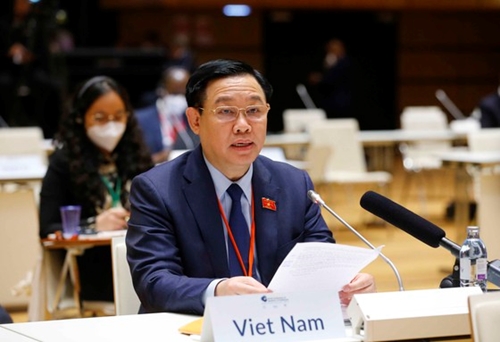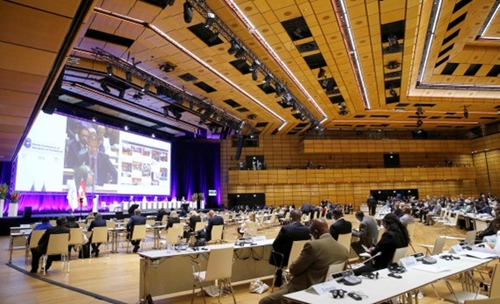    |
 |
|
N.A. Chairman Vuong Dinh Hue (Photo: SGGPO) |
During the panel discussion on “The post-pandemic recovery: Transforming the economy to combat climate change and promote sustainable development,” Hue said the world is facing twin challenges – containing the COVID-19 and recovering from the heavy toll it is taking, as well as dealing with adverse impacts of climate change – which necessitates countries making institutional and governance reforms.
Vietnam has been prioritizing its resources and engaging all people to drastically fight the COVID-19 resurgence so as to fulfil its “twin goals” of keeping the virus at bay and reviving the economy. The country has been striving to provide assistance to businesses, keep the supply chain going and ensure social welfare, he said.
As one of the ten countries most vulnerable to climate change and sea level rise, he continued, Vietnam has taken a comprehensive set of measures to tackle these issues. The country is working to cut consumption of fossil fuels and increase use of renewable energy by 25 percent by 2030. It launched a project to plant up to 1 billion additional trees nationwide by 2025 in April and is also committed to reducing greenhouse gas (GHG) emission by 9 percent using domestic resources or by 27 percent with international assistance.
Legislators must back the government in taking strong actions in these matters while strengthening inspection and improving legal framework to step up COVID-19 response efforts and at the same time, realise the COP-21 commitments and transform the economy towards a green and circular economy and sustainable development, the N.A. Chairman said.
Lawmakers should also facilitate public-private partnerships and encourage businesses’ innovative ideas, he noted, adding that developed countries need to play a pioneering role in fulfilling GHG emission reduction commitments; and provide technical and financial support for developing nations and help them improve technology capacity.
    |
 |
|
A panorama of WCSP5 (Photo: SGGPO) |
The Vietnamese top legislator later delivered remarks at the Interactive General Debate’s motion on “The global response to the COVID-19 pandemic challenges multilateralism’s ability to deliver for the people.” He underscored the role of multilateral organizations in coordinating actions to protect people’s lives and rights and the importance of international partnership via multilateral cooperation mechanism, citing the World Health Organization (WHO) as an example. WHO has led multiple COVID-19 response initiatives, such as the Access to COVID-19 Tools (ACT) Accelerator and the global vaccine-sharing scheme COVAX Facility.
He called on all nations to work together and contribute their resources to revive multilateralism in order to win the battle against the coronavirus. He also urged enhancing the effectiveness of multilateral cooperation to soon keep the virus at bay; facilitating transfer of vaccine production technology and ensuring all nations have equal access to COVID-19 vaccine supply; promoting collaboration in COVID-19 vaccine and medicine manufacturing; and increasing assistance to help developing countries fully and timely realize sustainable development goals.
At the panel discussion “Mitigating the impact of the COVID-19 pandemic,” Hue shared experience of Vietnam in adopting a people-centered approach to formulate COVID-19 policies. The Vietnamese N.A. has play a key role in the National Steering Committee for COVID-19 Prevention and Control and acted fast in approving and implementing measures to aid affected businesses and people, he said.
He stressed that it is crucial for parliaments to further improve legal frameworks for the protection of women and children, the elderly and people with disabilities and the response to economic uncertainty and poverty relapse caused by the pandemic.
Parliaments should also bolster information and experience exchange and beef up cooperation in COVID-19 fight in a bid to mitigate its impacts and maintain peace, stability and economic development in each country towards fulfilling the SGDs by 2030.
Source: VNA